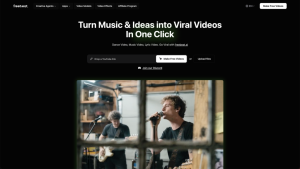Thinking about a career in fashion? It can feel overwhelming with so many options out there. But don’t worry! This guide will help you explore the exciting world of fashion jobs in the USA. Whether you’re into design, marketing, or e-commerce, there’s something for everyone. Let’s break it down and find out how you can kickstart your stylish career!
Key Takeaways
- Identify what part of the fashion industry excites you the most.
- Develop a mix of creative, business, and technical skills to stand out.
- Build a strong portfolio with a resume and cover letter that highlights your work.
- Network with industry professionals both online and at events.
- Look for job opportunities on various platforms and consider internships to gain experience.
Identifying Your Passion In Fashion Careers
So, you want to work in fashion? That’s awesome! But fashion is HUGE. It’s not just about being a designer or a model. Figuring out what really excites you is the first step. It’s like trying to find your favorite ice cream flavor – you gotta try a few to know for sure!
Understanding Different Roles
Okay, let’s break it down. When people think of fashion, they often picture designers. And sure, that’s a big part of it. But there are so many other roles! Think about fashion e-commerce, the people who buy clothes for stores (buyers), the ones who make sure everything looks amazing in photoshoots (stylists), the writers who cover fashion (editors), and even the folks who handle the business side of things (marketing, PR, sales). Each role needs a different set of skills and interests. It’s important to explore these different avenues to see where your skills and interests align.
Exploring Various Fashion Sectors
It’s not just about what you do, but where you do it. Do you dream of working for a high-end luxury brand? Or maybe a fast-fashion retailer is more your style? Perhaps you’d prefer a cool, independent boutique? Or even a big department store? Each sector has its own vibe, its own pace, and its own set of challenges. Think about what kind of work environment you thrive in. Do you want something fast-paced and trend-driven, or something more classic and timeless?
Finding Your Niche
Okay, so you know the roles and the sectors. Now it’s time to get specific. What part of fashion really makes your heart sing? Are you obsessed with sustainable fashion? Do you have a knack for predicting trends? Are you all about the details of garment construction? Finding your niche is about identifying what you’re good at and what you genuinely enjoy. It’s where your passion meets your skills. Once you find that sweet spot, you’ll be much more motivated and successful in your career.
It’s okay if you don’t know exactly what you want to do right away. The fashion industry is constantly evolving, so it’s important to stay curious and keep exploring. Talk to people who work in fashion, read industry publications, and try out different things. The more you learn, the better equipped you’ll be to find your perfect fit.
Essential Skills For Fashion Jobs
So, you’re dreaming of a fashion career? Awesome! It’s not all runway shows and fancy fabrics, though. You’ll need a solid set of skills to really make it. Let’s break down what you should focus on.
Creative Skills and Design
Okay, this one might seem obvious, but it’s more than just sketching pretty dresses. It’s about having an eye for detail, understanding color palettes, and knowing what looks good. Think about visual merchandising – why are certain clothes at the front of the store? It’s all planned! If you want to take your skills to the next level, consider enrolling in fashion design classes to learn designer techniques.
- Sketching and Illustration: Being able to quickly visualize your ideas is super important.
- Trend Forecasting: Knowing what’s going to be hot next season.
- Color Theory: Understanding how colors work together.
Business Acumen in Fashion
Don’t roll your eyes! Fashion is a business, after all. You need to understand how things work behind the scenes. This means knowing about budgeting, marketing, and even supply chain management. It’s not just about making beautiful things; it’s about selling them too.
Think about it: every piece of clothing has a story, from the design to the manufacturing to the marketing. Understanding that whole process is key.
Technical Skills for E-commerce
In today’s world, a lot of fashion happens online. That means you need to be comfortable with technology. This could involve anything from managing social media accounts to understanding website analytics.
- Social Media Marketing: Knowing how to use platforms like Instagram and TikTok to promote products.
- Data Analysis: Understanding website traffic and customer behavior.
- E-commerce Platforms: Being familiar with platforms like Shopify or Magento.
And hey, don’t underestimate the power of Excel! Seriously, fashion buyer use it all the time for everything from inventory management to sales forecasting.
Building Your Fashion Portfolio
Your fashion portfolio is your ticket to landing your dream job. It’s more than just a collection of your work; it’s a carefully curated presentation of your skills, creativity, and potential. Let’s break down how to make it shine.
Creating a Compelling Resume
Your resume is often the first impression you make, so make it count. Focus on tailoring it to each specific job you’re applying for. Don’t just list your experiences; highlight accomplishments and quantify them whenever possible. For example, instead of saying “Managed social media accounts,” say “Increased social media engagement by 30% in six months through targeted campaigns.” Use action verbs and keep it concise. A recruiter should be able to quickly grasp your skills and experience. Make sure to include a link to your online portfolio, if you have one.
Crafting an Engaging Cover Letter
A cover letter is your chance to show your personality and explain why you’re a great fit for the company and the role. Don’t just rehash your resume. Instead, tell a story. Explain what excites you about the company, what skills you bring to the table, and how you envision contributing to their success. Research the company thoroughly and mention specific projects or initiatives that resonate with you. Keep it brief and professional, and always proofread for errors. Think of it as a conversation starter, not a summary of your life story. You can network in fashion to get some inspiration.
Showcasing Your Work Effectively
This is where your creativity gets to shine! Your portfolio should be a visual representation of your skills and style. If you’re a designer, include sketches, mood boards, and finished designs. If you’re a stylist, showcase your best looks with high-quality photos. If you’re a writer, include samples of your articles or blog posts. Choose pieces that demonstrate your range and versatility. Consider creating a website or using a platform like Behance or Instagram to display your work. Make sure your portfolio is easy to navigate and visually appealing. Remember, it’s not just about what you’ve done, but how you present it.
Your portfolio is a living document. Update it regularly with your latest and greatest work. Seek feedback from mentors and peers to continuously improve it. And most importantly, let your passion for fashion shine through!
Here’s a simple table to help you organize your portfolio content:
| Category | Description | Examples |
|---|---|---|
| Design | Showcases your design skills and creativity. | Sketches, mood boards, technical drawings, finished garments. |
| Styling | Highlights your ability to create cohesive and visually appealing looks. | Photoshoots, editorial work, personal styling projects. |
| Writing | Demonstrates your writing skills and knowledge of the fashion industry. | Articles, blog posts, social media content, website copy. |
| Photography | Displays your photography skills and eye for detail. | Lookbooks, product shots, street style photography. |
| Digital Marketing | Showcases your ability to promote fashion brands online. | Social media campaigns, email marketing, website analytics reports. |
Networking In The Fashion Industry

Networking is super important in fashion. It’s not just about handing out business cards; it’s about building real relationships that can help you grow and learn. Think of it as planting seeds – you nurture them, and they blossom into opportunities. It can feel a bit daunting at first, but with the right approach, it becomes a natural part of your career journey.
Connecting with Industry Professionals
Okay, so how do you actually connect with people? Start by identifying who you want to meet. Are there designers whose work you admire? Maybe some stylists or editors? Once you have a list, start following them on social media, read their interviews, and get a feel for their work and interests. When you do get a chance to meet them, whether at an event or through an introduction, you’ll have something to talk about. Remember to be genuine and show a real interest in their work. Don’t just ask for a job right away; focus on building a connection first. You can also look for fashion internships to meet people.
Utilizing Social Media for Networking
Social media is a game-changer. It’s not just for sharing selfies; it’s a powerful tool for connecting with people in the industry. Platforms like LinkedIn and Instagram are goldmines. Join relevant groups, participate in discussions, and share your own work. Don’t be afraid to reach out to people whose work you admire. A simple, thoughtful message can go a long way. Just remember to keep it professional and avoid being too pushy. Think of your social media presence as your online portfolio – make sure it reflects your best work and your personality. It’s a great way to show your runway trend knowledge.
Attending Fashion Events and Workshops
Fashion events and workshops are fantastic opportunities to meet people face-to-face. Whether it’s a runway show, a sample sale, or a panel discussion, these events bring together people who are passionate about fashion. Don’t just stand in the corner and observe; strike up conversations with people. Ask them about their work, their experiences, and their advice. Remember to exchange contact information so you can follow up later. And don’t forget to dress the part! You want to make a good impression, so choose an outfit that reflects your personal style and shows that you understand the industry. It’s all about putting yourself out there and making the most of every opportunity.
Networking isn’t about collecting contacts; it’s about building relationships. Focus on creating genuine connections, offering value, and being a supportive member of the fashion community. Your network will become one of your greatest assets.
Finding Fashion Job Opportunities

So, you’re ready to actually find a job in fashion? Awesome! It’s not always easy, but knowing where to look is half the battle. Let’s break down some key places to start your search.
Job Boards and Online Platforms
Online job boards are a pretty standard way to find openings. Websites like Indeed, LinkedIn, and Glassdoor often have a ton of fashion-related listings. Don’t just stick to the big names, though. There are also some niche job boards that focus specifically on creative industries, which can be super helpful. Also, don’t forget to set up job alerts! That way, you’ll get notified when new positions that match your criteria pop up. It saves you from having to constantly refresh the page. You can also find fashion career opportunities on company websites.
Direct Applications to Brands
Okay, this one takes a little more guts, but it can really pay off. Instead of waiting for a company to post a job, why not reach out directly? Find brands you admire and check out the “Careers” section of their website. Even if they don’t have any open positions listed, it never hurts to send a well-crafted email expressing your interest and highlighting your skills. Sometimes, companies create positions for talented people who show initiative. It shows you’re serious and passionate about working for them. Plus, you might get your resume in front of the right person even if they aren’t actively hiring. It’s a bit of a gamble, but the potential reward is worth it. You can also try emailing companies directly, instead of waiting for them to post jobs.
Leveraging Internships for Experience
Internships are a fantastic way to get your foot in the door. Many companies use their internship programs as a way to scout out potential full-time employees. Even if the internship doesn’t lead to a job right away, the experience and connections you make can be invaluable. Look for internships that align with your interests and career goals. Don’t be afraid to start small – even a short internship can give you a taste of the industry and help you build your resume. You can find internships by visiting the official website of the fashion brand. Also, remember that Fashion Careers College can help you get started.
Internships are a great way to gain experience and make connections. Even if the internship doesn’t lead to a full-time job, the skills and knowledge you gain will be valuable in your job search. Plus, you’ll get a chance to see if the company and the role are a good fit for you.
Navigating The Fashion Job Market
Understanding Industry Trends
Staying informed is super important. The fashion world changes fast! Keep an eye on what’s new in designs, materials, and how clothes are sold. Read industry blogs, follow influencers, and check out reports from fashion experts. Knowing what’s happening helps you make smart choices about your career and where you want to work. It’s not just about liking clothes; it’s about understanding the business behind them.
Adapting to Remote Work Opportunities
Remote work is becoming more common, even in fashion. Some design jobs, marketing roles, and even styling positions can be done from home. Make sure your online skills are sharp. Know how to use video conferencing, project management tools, and online design software. Show in your resume and interviews that you can work well on your own and communicate effectively with a team, even if you’re not in the same room.
Exploring Freelance Options
Freelancing can be a great way to get your foot in the door or to have more control over your career. Many designers, stylists, and writers start out freelancing. It lets you build your portfolio, make connections, and try out different types of work. To succeed as a freelancer, you need to be organized, good at managing your time, and able to find your own clients. Consider these points:
- Build a strong online presence.
- Network actively.
- Set clear rates and expectations.
Freelancing offers flexibility and diverse experiences, but it also requires self-discipline and strong business skills. It’s a path that can lead to great opportunities if you’re willing to put in the work.
Consider exploring career paths to find the right fit for your skills and interests.
Preparing For Fashion Interviews
Researching Companies and Roles
Okay, so you’ve landed an interview – awesome! Now, don’t just wing it. Seriously, take some time to do your homework. I usually start by digging into the company’s website. What’s their mission? What are their values? What’s their latest collection or campaign? Knowing this stuff shows you’re genuinely interested, not just looking for any job. Also, check out their social media. See what people are saying about them. Glassdoor can also be a goldmine for insider info.
Then, really understand the role you’re interviewing for. What are the key responsibilities? What skills are they looking for? Think about how your experience matches up and be ready to give specific examples. It’s not enough to say you’re a hard worker; show them how you’ve been a hard worker in the past. Understanding the company’s values is key.
Practicing Common Interview Questions
Alright, let’s be real – some interview questions are just classics. “Tell me about yourself,” “What are your strengths and weaknesses?” “Why do you want to work here?” Don’t get caught off guard by these. Practice your answers out loud. Seriously, stand in front of a mirror or record yourself. It feels silly, but it helps you refine your answers and get comfortable talking about yourself.
Think about the STAR method (Situation, Task, Action, Result) for answering behavioral questions. It helps you structure your responses and give concrete examples. Also, prepare some questions to ask the interviewer. It shows you’re engaged and curious. I usually ask about the team culture or opportunities for professional development. It’s also a good idea to have some questions ready about the interview process.
Dressing for Success in Interviews
Okay, this is fashion, so what you wear matters. But it’s not just about looking stylish; it’s about showing you understand the company’s brand and culture. If you’re interviewing at a cutting-edge streetwear brand, a stuffy suit probably isn’t the way to go. But if it’s a luxury fashion house, you might want to dress a bit more formally.
- Do your research. Check out their website and social media to get a sense of their aesthetic.
- When in doubt, err on the side of being slightly more dressed up than down.
- Make sure your clothes are clean, well-fitting, and free of wrinkles.
- Pay attention to the details – shoes, accessories, grooming.
Remember, you want to look polished and professional, but also authentic. Don’t try to be someone you’re not. Let your personality shine through, and wear something that makes you feel confident. After all, confidence is the best accessory. First impressions matter, so make yours count! Presentation is key.
Wrapping Up Your Fashion Journey
As you think about a career in fashion, remember that it’s all about finding what excites you. Whether you’re drawn to design, marketing, or something else entirely, there’s a spot for you in this vibrant industry. Take the time to explore different roles and companies, and don’t hesitate to reach out to others in the field. Networking can open doors you didn’t even know existed. Keep learning, stay curious, and be ready to adapt. The fashion world is always changing, and so can your path within it. With passion and persistence, you can carve out a stylish career that’s uniquely yours.
Frequently Asked Questions
What are some common jobs in the fashion industry?
There are many jobs in fashion, like fashion designer, stylist, and editor. Other roles include fashion marketing, e-commerce specialist, and fashion journalist.
How can I find my passion in fashion?
To find your passion, think about what part of fashion excites you the most. Do you like designing clothes, marketing them, or writing about trends? Explore different roles to see what fits you best.
What skills do I need for a job in fashion?
You should have creative skills for design, business skills for marketing, and technical skills for online shopping platforms. Being curious and willing to learn is also very important.
How do I build a fashion portfolio?
Start by creating a strong resume and cover letter. Include examples of your work, like designs or articles, to show what you can do.
What is the best way to network in the fashion industry?
You can network by connecting with people on social media like LinkedIn and Instagram. Attend fashion events and workshops to meet professionals in person.
Where can I find job openings in fashion?
Look for job openings on fashion company websites, job boards, and social media. Internships are also a great way to start your career and gain experience.
Read More:

Peyman Khosravani is a global blockchain and digital transformation expert with a passion for marketing, futuristic ideas, analytics insights, startup businesses, and effective communications. He has extensive experience in blockchain and DeFi projects and is committed to using technology to bring justice and fairness to society and promote freedom. Peyman has worked with international organizations to improve digital transformation strategies and data-gathering strategies that help identify customer touchpoints and sources of data that tell the story of what is happening. With his expertise in blockchain, digital transformation, marketing, analytics insights, startup businesses, and effective communications, Peyman is dedicated to helping businesses succeed in the digital age. He believes that technology can be used as a tool for positive change in the world.











